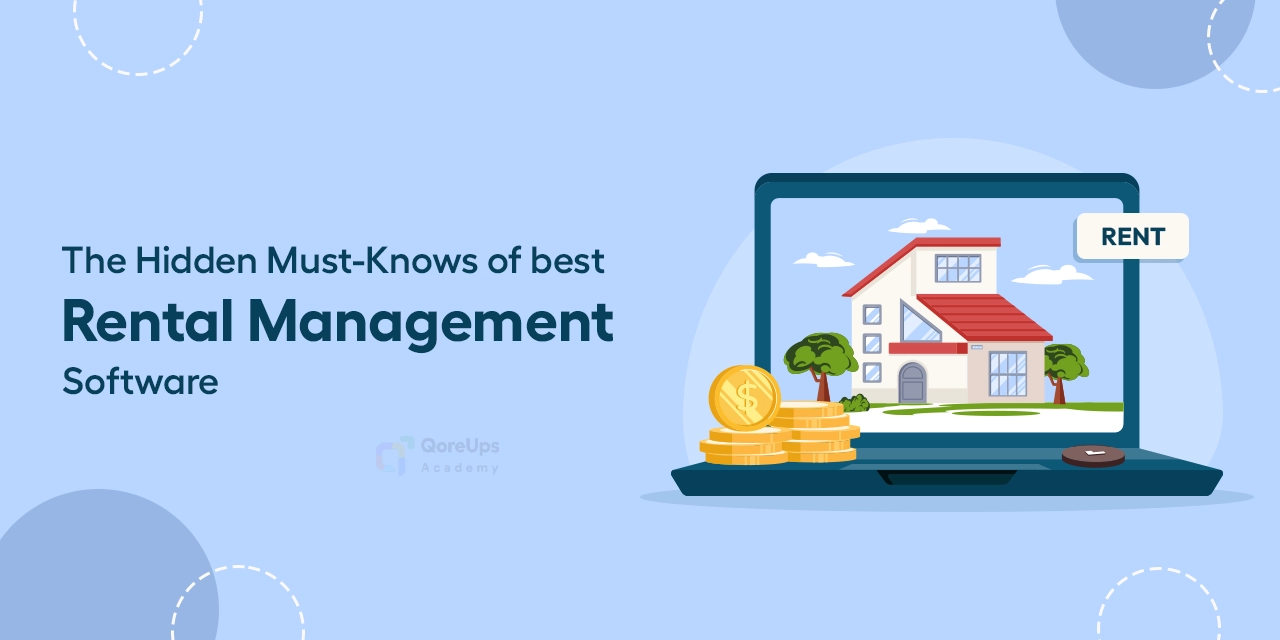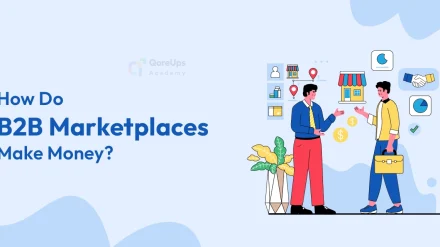Hey there, business owners! If you are looking to launch or expand your rental business with the software, then you’ve probably been searching for the best rental management software. Well, guess what? You have landed at the right place. This blog is packed with what you’re looking for.
The market is competitive, customer expectations are high, and operational mistakes cost more than ever. This is why the best rental software is not a “nice-to-have” anymore. It’s the silent force that decides who grows and who falls behind.
With so many options, knowing what truly drives success in your rental business can make all the difference.
Keep reading, and by the end of this blog, you’ll have a solid understanding of the ‘not-so-secret but often overlooked’ gems every business owner should consider before choosing the best rental software.
Ready? Let’s go!
Key Takeaway
- Understand the hidden risks in rental operations, like double bookings and payment errors, that can quickly escalate.
- Focus on key software features that streamline tasks, reduce mistakes, and save time, such as booking management and digital contracts.
- Prioritize scalability in your best rental management software choice to ensure it grows with your business and can handle future demands.
- Test the rental management software before you buy by running real business data to make sure it delivers the results you need.
Rental Software: The Risk Shield Most Investors Overlook
Many investors believe that risk is an inherent part of the market. From a top-level view, the most obvious risks may seem to be price drops or tenant turnover. But compared to operational risks, these are relatively minor.
Here’s what the operation risk feels like:
- When a property gets booked for two renters at the same time (double booking), forcing you to issue a refund or discount.
- A vendor goes unpaid simply because no one processed their invoice on time. This can cause delays in services, strain relationships, and create unnecessary stress.
- When contracts are lost or remain unsigned, it can lead to confusion and disputes with tenants, leaving you exposed to legal or financial risks.
- Errors in processing tenant payments, such as failed transactions, delays, or incorrect charges, can disrupt cash flow and increase your administrative work.
Operational difficulties rarely stay small; they can quickly snowball, raising costs and stress levels.
This is where choosing the right rental marketplace software helps mitigate risk by organizing workflows, so you can identify your blind spots sooner.
This naturally raises the question,
How Can The Best Rental Software Safeguard My Rental Operations?
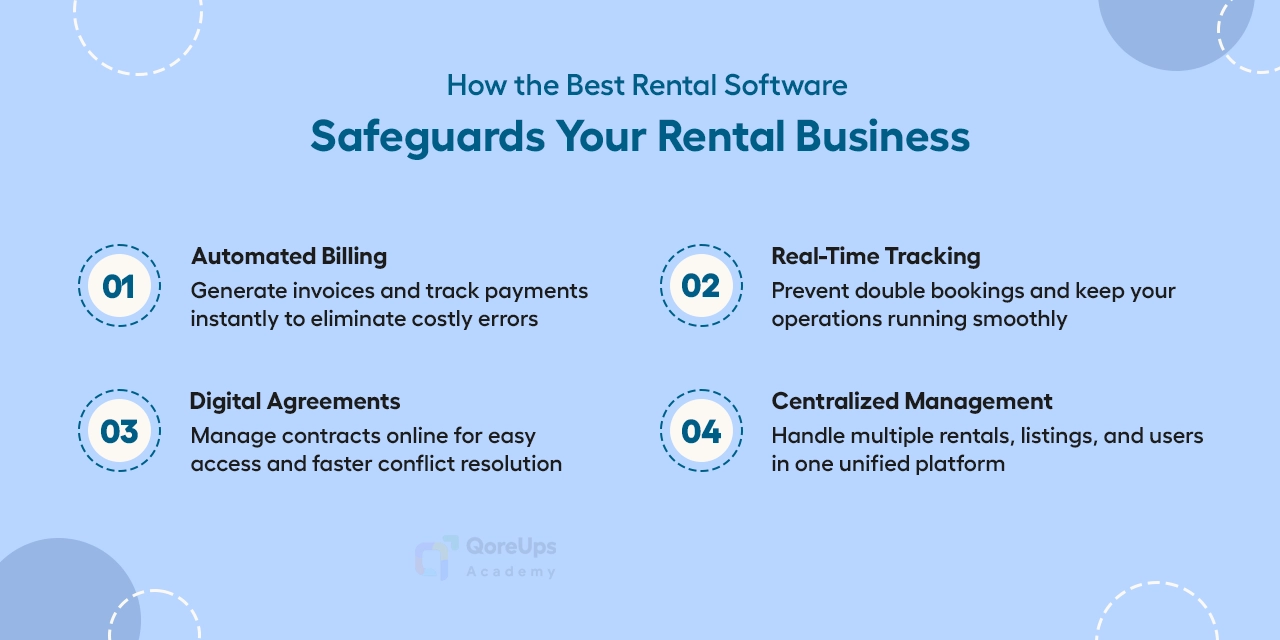
It provides solid protection against operational and financial risks, including:
- Managing digital records of agreements online to make resolving conflicts easier.
- Automatically generating invoices and tracking payments to reduce errors.
- Real-time tracking to prevent overlapping bookings.
- Simplifying operations by managing multiple rentals in a centralized space.
Market estimates show that the global rental industry is set to grow significantly over the next decade. Businesses that overlook marketplace software risk falling behind their competitors.
To solidify your edge in the rental business, here’s a look at the features that really make a difference.
Don’t Miss Out on the Latest Marketplace Tips – Join QoreUps Academy!
Which Features Will Actually Save You Time and Cut Costs?
When building your rental marketplace, it’s easy to get lost in an endless list of features.
No, you really don’t have to include every single one of them. Just stick to the basics.
Concentrating on features that take over repetitive human tasks can lead to huge returns.
Here are the key features that are most important in the rental business.
#1. Booking & Reservation Management
This lets you track all bookings in real-time with a live calendar. You can prevent double bookings automatically. Managing multiple properties under one dashboard cuts down on time spent on administrative tasks.
#2. Payment Gateway Integration
This allows you to accept online payments directly through your platform. You can track transactions automatically, cutting down on manual accounting and ensuring steady, predictable cash flow.
#3. Built-in SEO tools
This helps you see how your marketplace is performing and what gets the most attention. You can add SEO‑friendly titles and descriptions to boost visibility. It helps your platform get noticed more effectively.
#4. Renters & Vendor Management
This allows you to centralize information on renters and vendors. You can track vendor payments and communicate with both parties easily. It helps reduce tenant turnover and operational delays while saving time.
#5. Admin Dashboard
This lets you monitor key metrics like daily and total users, active users, listings, bookings, and profit, giving you the insights to run your rental business efficiently.
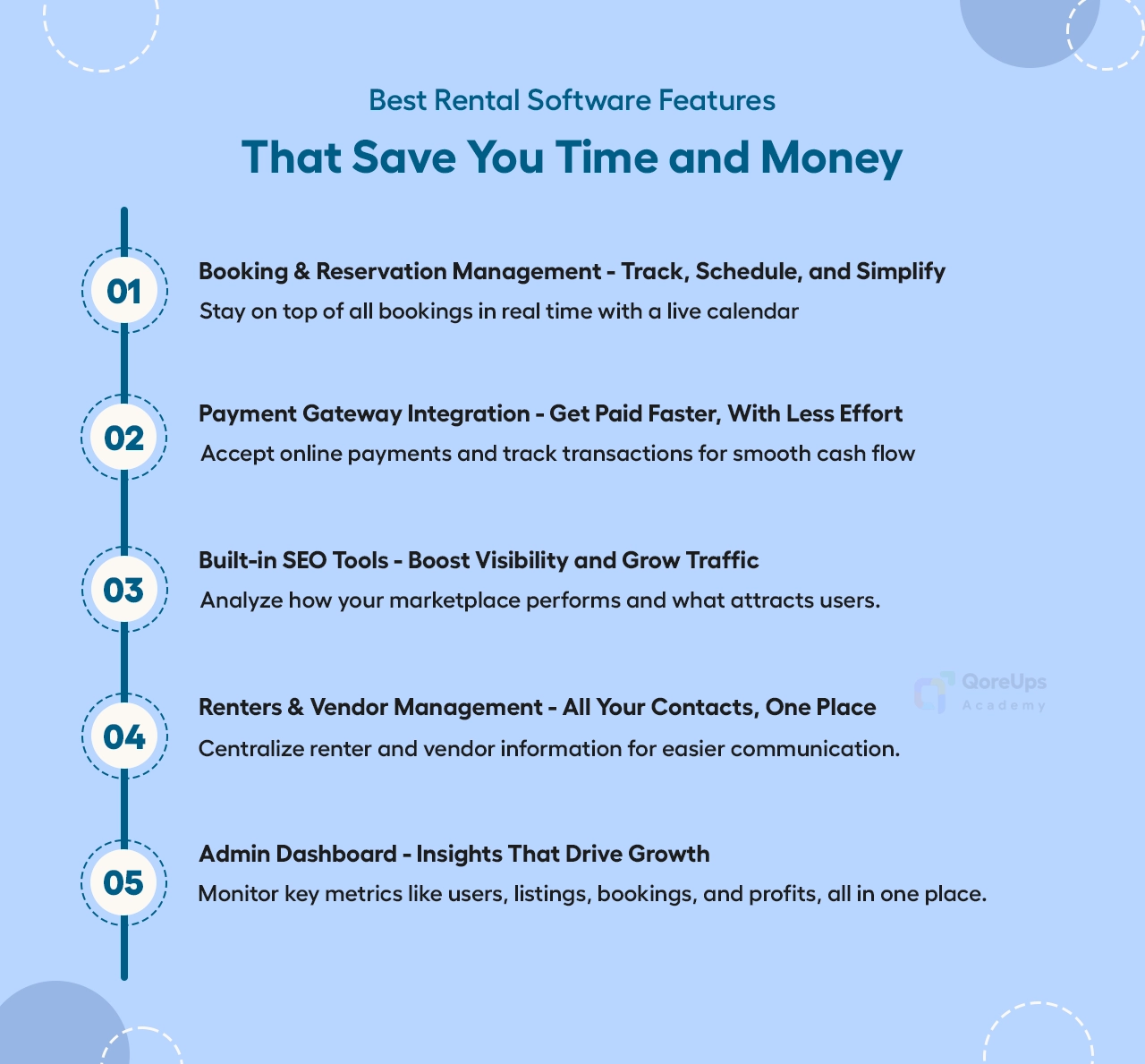
Also, don’t let buzzwords like ‘AI-driven‘ or ‘AI-integrated‘ fool you. Big claims like the best rental marketplace software that can ‘think for you’ or ‘automate everything’ often hide the fact that the so-called AI features don’t actually help you save time or money, and it’s mostly just hype.
With these hidden insights in mind, you’re probably wondering:
What’s the next step to make sure your rental business is set for success?”
Well, here it is:
Can Your Software Keep Up With Your Rental Business Growth?
Buying software is easy. Buying software that scales is hard. Many entrepreneurs choose a solution that works for today, but as their business grows, they hit limits that cost time and money to overcome.
Especially with the short-term vacation rental market expected to grow at a CAGR of 11.4% from 2025 to 2030 (Grand View Research), planning for future growth has never been more important.
So, make sure to ask these practical questions about scalability to your preferred rental software company:
#1. Can It Handle More Listings and More Users?
Will you be able to easily upgrade your plan as your user base grows? Some systems cap features on lower plans, forcing an expensive upgrade at the worst time. You want a platform where adding volume is smooth..
#2. Can It Support a Variety of Rentals?
Once your rental business takes off, there’s no telling how far it can go. Right now, you might manage short-term rentals, but in the future, you could expand to long-term leases or equipment rentals.
Remember, “rental” doesn’t have to mean just property. The best rental software should support a variety of rental offerings without requiring a complete rework.
#3. What Limits Exist on Users, Listings, or Transactions In This Plan?
Some software plans limit the number of active users, listings, or transactions per month. Exceeding these limits can trigger extra fees or cause performance throttling, so be sure to estimate your business growth carefully.
#4. How Does Performance Hold Under Load?
Performance testing is crucial. Some platforms run smoothly with a few users but lag when handling many concurrent requests. So, make sure to always test the best rental management software thoroughly during the free trial.
If these checks fail, the software becomes a liability. If they pass, the platform becomes a foundation.
Now that you know what question to ask, let’s take a look at what most don’t tell you when purchasing your rental software.
Looking Beyond the Appealing Price Tag
Your best rental management software cost is only part of the equation. The real cost includes all ongoing expenses. Watch for these hidden cost areas:
- Onboarding and Setup Fees: Some platforms may charge extra to get started. This can include initial setup, training, or help importing your business data to the new system. These costs aren’t always obvious upfront.
- Premium Features or Add-On Modules: Advanced features or additional modules may come at an extra cost. You might need them as your business grows. Check what’s included versus optional.
- Unused Licenses and Underutilization: Paying for subscriptions or licenses you don’t use can quietly increase expenses. Keep track of actual usage to avoid overpaying.
- User, Unit, or Property Overage Charges: Some plans limit users, listings, or transactions. Exceeding these limits can trigger extra fees or restrictions, so anticipate your business growth when choosing a plan.
Before you make your pick, make sure to check its true worth. How much money does this tool save you per year?
If it pays for itself quickly, it’s smart spending. If it doesn’t, walk away.
Your investment should work as hard as you do, giving back double the impact.
Since money is on the table, let’s look at how this software can boost your earnings.
Monetize Smarter: Rental Software Strategies That Bring Rewards
When you invest in the best rental management software, it’s reasonable to expect to earn money from it as well. Therefore, with the software, you can easily access:
- Commission fee
The commission fee is the bread and butter of your revenue, quietly adding up with every rental booked through your platform.
- Listing fee
Listing fees provide a steady revenue stream by charging hosts a one-time or recurring fee to showcase their items or properties on your marketplace.
It’s a simple way to monetize visibility while giving your hosts a chance to reach more renters.
- Subscription fee
By enabling hosts to subscribe to a structured plan that grants them special advantages like extra listings and reduced platform fees, you can create a sustainable income through recurring fees.
These represent just a few of the potential revenue streams beyond simple commission on each transaction.
After looking into how to make money, let’s shift gears and focus on ways to save it.
The best way to save money in your rental business? Simple, don’t spend any. Since that’s not really an option, the next best strategy is making smart choices with your rental marketplace software.
What Is the Secret to Huge Savings? Testing Software Properly
Testing is the best way to avoid buyer’s remorse. A free trial gives you the chance to try before you commit. Here’s a practical testing plan that investors actually use:
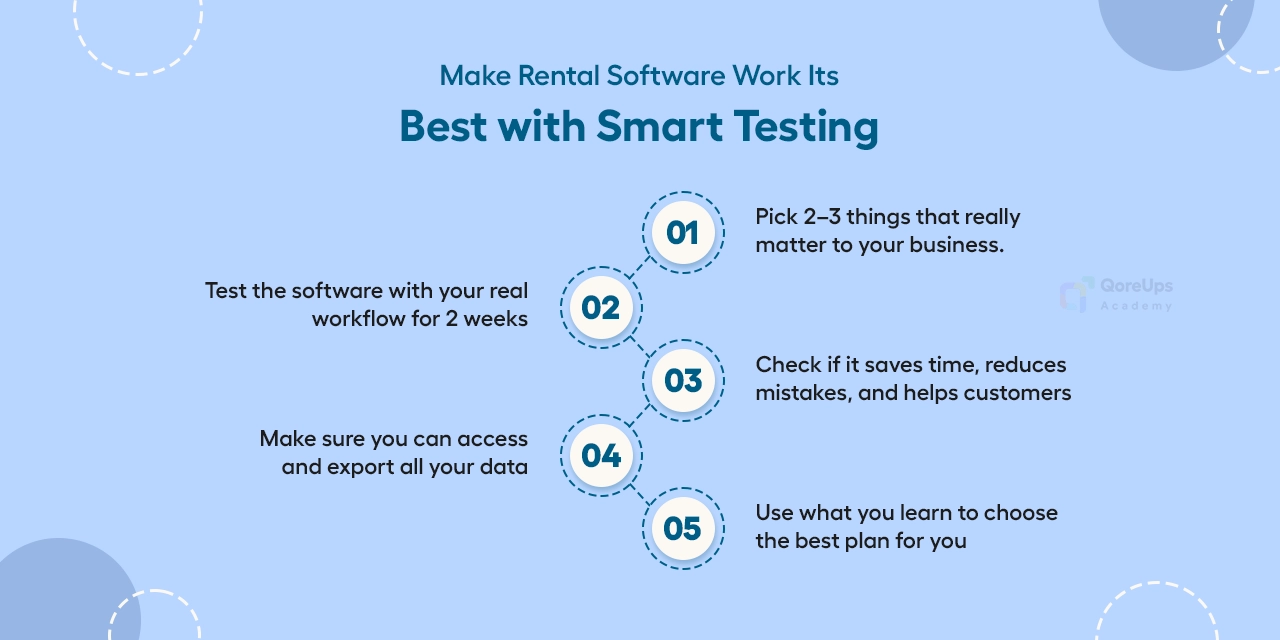
Step #1: Decide what matters
Pick 2–3 things that really matter to your business. For example, save time on admin tasks, stop double bookings, or cut monthly bookkeeping work.
Step #2: See It in Action
Even if some say a shorter trial is enough, don’t rush. A two-week trial is the best way to get a clear picture of how the software performs with your actual workflow.
Step #3: Track the Impact
Compare before and after. Look at errors, task times, and customer feedback. Did it save time? Reduce mistakes? Make life easier?
Step #4: Make Sure You Own Your Data
Ensure you can easily export all your data and transfer it to another system. If you can’t access your data easily, consider it a serious concern.
Step #5: Use the Results to Your Advantage
Let your trial data guide the decision. Select the plan that aligns with your users, transactions, and business needs.
Now that you’ve gathered the right data and tested the “best rental management software”, how do you choose the right rental software for your business?
How Should You Run Your Selection Process?
Make buying a process, not an event. Here are steps that save time and reduce regret:
- Define clear goals (set clear, measurable goals)
- Shortlist solutions that clearly match those outcomes
- Check reviews and request references for real user insights
- Evaluate the rental management software with real business data
- Ensure the software provider can support you long-term
- Choose the solution that delivers the best results in your trial
This helps you choose the option that makes the most sense for your rental business.
Conclusion: Elevate Your Business with the Best Rental Software
The best rental management software isn’t about fancy features. It really comes down to three key things:
- Reducing operational risk.
- Saving time and minimizing operational costs.
- Expanding operations without extra cost.
Whether you’re starting your rental business or upgrading it with rental marketplace software, treat it as the foundation of your operations. Test it, see what works, and choose a platform that scales with you and provides valuable insights.
The right system is what makes your operations smoother, more efficient, and predictable.
Recent market data shows rental operators are moving toward integrated, streamlined tools. Those who adopt early see measurable gains in occupancy, efficiency, and revenue.
Make the smart choice, and watch your rental business grow, scale, and succeed.

